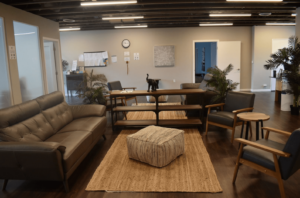Recovery from substance use disorder is a journey that doesn’t end when you complete your initial treatment program. While achieving sobriety is a significant milestone, maintaining long-term recovery requires ongoing vigilance, support, and effective strategies for managing the various triggers that can lead to relapse. Understanding these triggers and having a comprehensive aftercare plan in place is crucial for sustained sobriety and a fulfilling life in recovery.
At Tres Vistas Recovery, we understand that successful recovery extends far beyond the initial treatment phase. Our comprehensive approach includes robust aftercare planning and ongoing support services designed to help you navigate the challenges of early recovery and beyond. According to the National Institute on Drug Abuse (NIDA), relapse rates for substance use disorders are similar to those of other chronic diseases, with 40-60% of people experiencing relapse during their recovery journey.
Understanding Relapse: It’s Not a Sign of Failure
Before diving into specific triggers, it’s important to understand that relapse is often part of the recovery process rather than a sign of personal failure or treatment ineffectiveness. The Substance Abuse and Mental Health Services Administration (SAMHSA) recognizes recovery as a process of change through which people improve their health and wellness, live self-directed lives, and strive to reach their full potential.
Relapse typically occurs in three stages: emotional relapse, mental relapse, and physical relapse. Recognizing the early warning signs and having strategies in place to address triggers before they escalate is a critical component of successful long-term recovery.
Common Environmental Triggers
Environmental triggers are external situations, places, or circumstances that can create cravings or urges to use substances. These triggers are often deeply connected to past substance use patterns and can be particularly challenging in early recovery when new coping mechanisms are still being developed.
High-Risk Locations: Certain places hold strong associations with past substance use. These might include bars, former dealers’ neighborhoods, or even specific rooms in your home where you used to consume substances. The brain’s memory centers create powerful associations between these locations and the substances used there, making exposure to these environments particularly challenging.
Social Situations: Parties, celebrations, or gatherings where substances are present can create intense pressure and trigger cravings. Even well-meaning friends or family members who don’t understand addiction may unknowingly create challenging situations by offering substances or expressing confusion about your abstinence.
Paraphernalia and Visual Cues: Seeing drug paraphernalia, empty bottles, or other items associated with substance use can trigger powerful memories and cravings. These visual cues can appear unexpectedly in movies, social media, or everyday life, making it important to have strategies for managing these encounters.
Emotional and Psychological Triggers
Emotional triggers are often the most challenging to manage because they arise from internal experiences rather than external circumstances. Understanding and developing healthy coping mechanisms for these emotional states is crucial for long-term recovery success.
Stress and Overwhelm: Chronic stress, work pressure, financial difficulties, or major life changes can overwhelm coping mechanisms and trigger the desire to escape through substance use. The Centers for Disease Control and Prevention (CDC) has identified adverse childhood experiences and chronic stress as significant risk factors for substance use disorders.
Depression and Anxiety: Mental health conditions often co-occur with substance use disorders. According to the National Institute of Mental Health (NIMH), approximately 7.6% of U.S. adults experienced both a mental health disorder and substance use disorder in 2021. When depression or anxiety symptoms intensify, the temptation to self-medicate can become overwhelming.
Loneliness and Isolation: Feelings of disconnection, loneliness, or social isolation can trigger intense cravings for substances that previously provided temporary relief from these painful emotions. This is particularly challenging for individuals whose social circles were primarily centered around substance use.
Boredom and Lack of Purpose: Without the structure that treatment programs provide, some individuals struggle with too much unstructured time or a lack of meaningful activities. Boredom can lead to ruminating thoughts about substance use and create opportunities for relapse.
Social and Relationship Triggers
Human connections play a crucial role in both recovery and relapse. Understanding how relationships can impact your sobriety is essential for building a supportive network while avoiding harmful influences.
Peer Pressure and Social Expectations: Pressure from friends, family members, or social groups who may not understand or support your recovery can create significant challenges. This pressure might be direct (“just one drink won’t hurt”) or indirect (feeling excluded from social activities).
Relationship Conflicts: Arguments with spouses, family members, or friends can create intense emotional distress that may trigger the desire to use substances as a way to cope with or escape from interpersonal stress.
Enabling Relationships: Sometimes, well-meaning loved ones inadvertently enable relapse by making excuses for harmful behavior, providing financial support without accountability, or failing to maintain healthy boundaries around substance use.
Physical and Medical Triggers
Physical health issues and medical situations can create unique challenges for individuals in recovery, particularly when pain management or medical procedures are involved.
Chronic Pain: Many individuals with substance use disorders also struggle with chronic pain conditions. Managing pain without relapsing requires careful coordination with healthcare providers and often involves exploring non-pharmacological pain management techniques.
Medical Procedures: Surgery, dental work, or other medical procedures that typically involve prescription pain medications can create challenging situations for individuals in recovery. Planning and communication with healthcare providers are essential.
Physical Withdrawal: Even after completing initial detox, some individuals experience prolonged withdrawal symptoms that can last weeks or months. These physical discomforts can trigger cravings and thoughts of using substances for relief.
How Comprehensive Aftercare Addresses These Triggers
Effective aftercare programs provide the tools, support, and resources necessary to navigate triggers successfully while building a strong foundation for long-term recovery. At Tres Vistas Recovery, our aftercare approach is comprehensive and individualized to meet each person’s unique needs and circumstances.
Ongoing Therapy and Counseling: Regular individual therapy sessions provide a safe space to process triggers, develop coping strategies, and work through underlying issues that contribute to substance use. Our individual therapy programs utilize evidence-based approaches like Cognitive Behavioral Therapy (CBT) and Dialectical Behavior Therapy (DBT) to help clients develop healthy thought patterns and emotional regulation skills.
Group Support: Participating in ongoing group therapy or support groups provides peer connection, accountability, and shared strategies for managing triggers. Our group therapy sessions create a community of individuals who understand the challenges of recovery and can provide mutual support and encouragement.
Family Involvement: Addiction affects entire families, and recovery is often most successful when family members are involved in the process. Our family therapy programs help repair relationships, improve communication, and educate family members about addiction and recovery.
Relapse Prevention Planning: Developing a detailed relapse prevention plan is a cornerstone of effective aftercare. This plan identifies personal triggers, warning signs, and specific strategies for managing high-risk situations. It also includes emergency contacts and action steps to take if cravings become overwhelming.
Building a Strong Support Network
One of the most protective factors against relapse is having a strong, supportive network of people who understand and support your recovery goals. Building this network takes time and intention, but is crucial for long-term success.
Sober Social Connections: Developing friendships and social connections with people who don’t use substances or who are also in recovery provides social support without the risks associated with substance-using peers. Many people find lasting friendships through support groups, recovery-focused activities, or sober social events.
Professional Support Team: Maintaining relationships with addiction counselors, therapists, medical providers, and other professionals creates a comprehensive support network that can address various aspects of recovery and overall health.
Accountability Partners: Having trusted individuals who can provide honest feedback, support during difficult times, and accountability for recovery goals creates an additional layer of protection against relapse.
Lifestyle Changes That Support Long-Term Recovery
Successful long-term recovery often involves significant lifestyle changes that support physical health, emotional well-being, and overall life satisfaction. These changes help create a life that is fulfilling without substances.
Stress Management Techniques: Learning and regularly practicing stress management techniques such as meditation, deep breathing exercises, yoga, or other mindfulness practices provides healthy alternatives to substance use when stress levels rise.
Physical Health and Wellness: Regular exercise, proper nutrition, and adequate sleep support both physical and mental health while providing natural mood-boosting benefits that can reduce cravings and improve overall well-being.
Meaningful Activities and Purpose: Engaging in work, volunteering, creative pursuits, or other meaningful activities provides structure, purpose, and satisfaction that supports long-term recovery. Many individuals find that helping others in recovery becomes a powerful source of meaning and motivation.
Specialized Aftercare for Different Types of Addiction
Different substances present unique challenges and may require specialized aftercare approaches. Understanding these differences helps ensure that aftercare plans are tailored to address specific risks and needs.
Opioid Addiction: Our opioid treatment programs may include medication-assisted treatment (MAT) as part of long-term aftercare, along with specialized support for managing cravings and avoiding high-risk situations associated with opioid use.
Cocaine and Stimulant Addiction: Recovery from cocaine addiction may require specific strategies for managing the intense cravings and mood changes associated with stimulant withdrawal, along with techniques for building healthy excitement and energy in recovery.
Prescription Drug Dependency: Our prescription drug treatment aftercare focuses on working with healthcare providers to manage legitimate medical needs while maintaining recovery, including pain management strategies and medication monitoring.
The Role of Continuing Care in Different Treatment Levels
Aftercare planning begins during initial treatment and continues throughout the recovery journey. Different levels of care provide different foundations for ongoing recovery support.
Transitioning from Intensive Programs: Individuals completing our Intensive Outpatient Program (IOP) or Partial Hospitalization Program (PHP) benefit from structured step-down planning that gradually reduces support intensity while maintaining connection to care.
Long-Term Outpatient Support: Ongoing participation in less intensive outpatient services provides continued support while allowing individuals to focus on building their lives in recovery, including work, relationships, and personal goals.
Technology and Recovery Support
Modern aftercare programs increasingly incorporate technology to provide support and resources that are accessible anytime, anywhere. These tools can be invaluable for managing triggers and maintaining a connection to support networks.
Recovery Apps and Digital Tools: Various smartphone applications provide meditation guidance, craving management tools, support group connections, and progress tracking that can supplement in-person aftercare services.
Telehealth Services: Online therapy sessions, virtual support groups, and remote check-ins with healthcare providers make ongoing support more accessible, particularly for individuals with transportation challenges or busy schedules.
Creating Your Personal Aftercare Plan
An effective aftercare plan is highly individualized and addresses your specific triggers, needs, and circumstances. Working with your treatment team to develop this plan ensures that you have concrete strategies and resources in place before completing initial treatment.
Key components of a comprehensive aftercare plan include:
- Trigger identification and management strategies: Specific plans for handling your most challenging triggers
- Support system contacts: Phone numbers and contact information for therapists, sponsors, family members, and other support people
- Emergency action steps: Clear instructions for what to do if cravings become overwhelming or if you feel at risk of relapse
- Healthy lifestyle goals: Specific commitments to exercise, nutrition, sleep, and other health-supporting activities
- Meaningful activity planning: Commitments to work, volunteering, hobbies, or other purposeful activities
Moving Forward with Confidence
Recovery is a lifelong journey that requires ongoing commitment, support, and adaptation. While triggers and challenges will continue to arise, having a comprehensive aftercare plan and a strong support network provides the foundation for navigating these difficulties successfully.
At Tres Vistas Recovery, we’re committed to supporting you throughout your recovery journey, not just during initial treatment. Our comprehensive aftercare services are designed to help you build a fulfilling, substance-free life while managing the triggers and challenges that are a normal part of recovery.
Remember that seeking ongoing support is a sign of strength, not weakness. The most successful individuals in recovery are those who remain connected to care, continue learning and growing, and maintain their commitment to the practices and relationships that support their sobriety.
If you’re ready to begin your recovery journey or need support in managing triggers and maintaining sobriety, contact Tres Vistas Recovery at (844) 578-1971. Our experienced team is here to help you develop the skills, strategies, and support network necessary for lasting recovery and a fulfilling life free from substance use.














